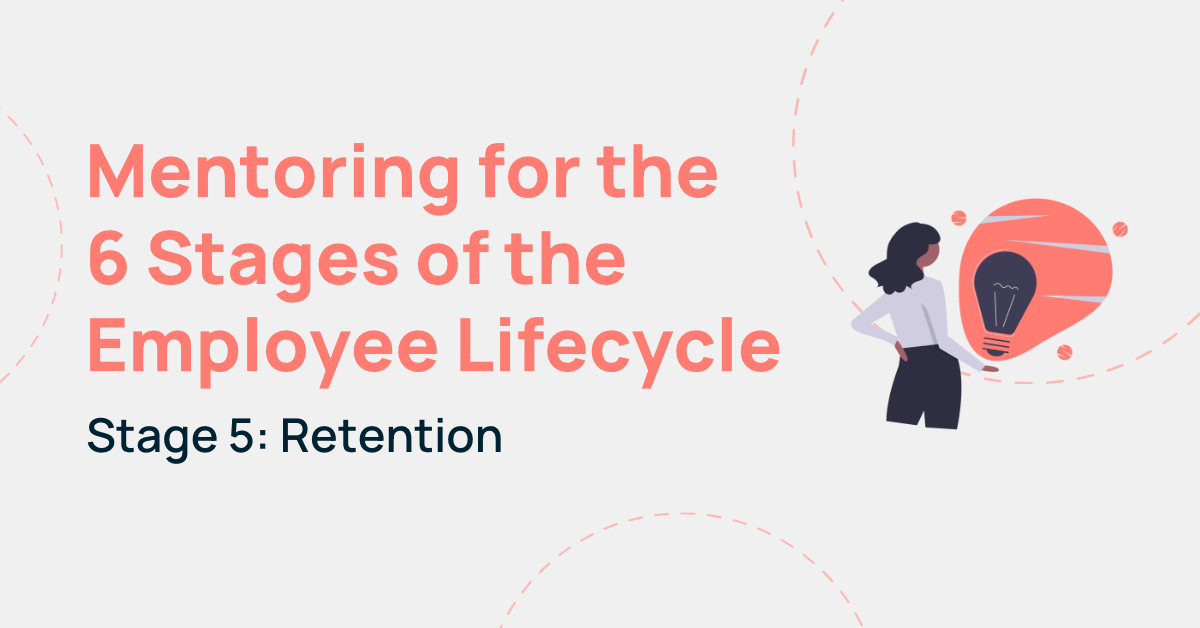Welcome back to our “Mentoring for the 6 Stages of the Employee Lifecycle” series!
So far, we’ve covered:
In this post, we’ll cover employee retention and how mentoring helps organizations improve it. But before we get into that, let’s first look at the retention problem many companies today are facing.
The Retention Problem
Many businesses today struggle with the challenge of retaining top talent. With the job market being as competitive as it is, it’s so important to find effective ways to retain your best employees.
But in order to talk about employee retention, and subsequently, how mentoring can help here, we also need to talk about engagement. Why? Because, according to Gallup’s State of the American Workplace report, “Employees who are engaged are more likely to stay with their organisation, reducing overall turnover and the costs associated with it.”
But here’s the bad news: per another Gallup survey, only 14% of your employees are actively engaged in their work. And those costs they were talking about? They estimate that the price tag of a disengaged employee is roughly 34% of their salary, accounting for lost productivity, additional sick days, etc. And if that employee simply decides to leave? Human Resources Director (HRD) AU puts the average cost of rehiring and training at $23,000 AUD.
Given these less-than-ideal numbers, what can businesses do to ensure their employees remain engaged, thereby improving retention?
One critical tool that many successful companies are leveraging is mentoring.
In fact, a Deloitte survey found that employees who intend to stay with their organisation for more than five years are more than twice as likely to have a mentor.
And this can do big things to improve your bottom line. Case in point: One of our customers runs a mentoring program that routinely saves them $500,000 annually. How? Because it measurably improves their overall employee attrition rate.
So let’s explore the benefits of mentoring for employee retention and strategies for creating a successful retention-focused mentoring program.
The Benefits of Mentoring for Employee Retention
So let’s break down why mentoring is great for employee retention.
Mentoring provides a clear path for growth and development within the company
Mentoring opens up pathways for employees to achieve their own career objectives and goals while building a strong sense of loyalty to the company. This improves job satisfaction, making employees more likely to stay with the company.
Mentoring provides employees with more feedback
One contributor to low employee retention is a lack of workplace feedback, with 65% of all employees reporting that they would like to receive more feedback. Mentoring fills this void snuggly. An inherent part of all mentorships is ongoing communication and honest feedback. Mentor-mentee meetings occur frequently and involve a mentor sitting down and providing suggestions, feedback, and insights as to where the mentee is successful or has work to do. While not always job-specific, mentoring supplements job performance reviews perfectly while occurring frequently enough to keep employees in the feedback loop.
Mentorship helps employees feel more connected to their colleagues and the company as a whole
This can create a positive and supportive work environment and a sense of community. This encourages them to engage in more of the organisation’s activities, buy into its goals and mission, and generally be more motivated to give their best because they want to stay and see the organisation do well.
Mentoring can also help to build strong relationships between employees and their mentors. These relationships can be valuable not only for the employee’s professional development but also for their personal growth and well-being. Mentors can provide guidance and support not only in the workplace, but also in other areas of life, such as work-life balance, stress management, and career planning.
Mentoring helps mitigate employees’ issues with management
According to studies, about 50% of employees leave their companies to get away from their bosses while 70% of workplace engagement is a variant of an employee’s relationship with their boss.
Giving employees the opportunity to forge mentoring relationships allows them to find alternative manager figures within the organization. Mentors can provide mentees with a unique management-protege relationship that they can lean on in areas where their direct supervisor may fall short. Mentors can also act as additional support and help employees through tough moments and experiences where their direct manager cannot offer their time and support (e.g. performance reviews or conflict management). Mentors can also help mentees navigate difficult relationships with direct management.
Offering mentoring opportunities tells your people that the organization is invested in their growth
When employees see this in their employer, they are more likely to feel motivated and engaged in their work. This leads to increased productivity, better teamwork, and a more positive work environment overall.
Mentoring helps to create a culture of learning and development within a company
One of the major reasons we have such a fierce job-hopping economy is that young professionals are trying to maximise their career learning and time spent in the workplace. They aren’t satisfied by decent pay or a stable job; they want to be challenged and constantly learning. In some professional industries, 26% of employees report leaving their companies because of a lack of career development opportunities.
Mentoring can help to address specific workplace learning, but more importantly, addresses the employee’s need for personal growth and development. A good mentorship program will involve goal-setting, resource sharing, and action steps towards growth. All of these things, along with great career and personal advice, combine to satiate an employee’s need for ongoing learning and development much more than any course or temporary program.
Additionally, when employees are encouraged to learn and grow, they are more likely to feel engaged and invested in their work. This also leads to increased productivity and better overall performance for the company.
Mentoring opportunities show your people that they are valued
Mentoring makes employees feel valued and supported, therefore encouraging them to be more engaged in their work. For millennials, especially, who make up a significant chunk of the current workforce, this is important. And this is true whether they’re mentoring or being mentored. When employees feel like they have someone to turn to for guidance and support, they are more likely to feel connected to the organization and less likely to look for opportunities elsewhere. For mentors, it makes them feel that they’re valuable assets to the organisation and to their colleagues when they’re tasked with sharing their expertise.
Employees who feel unsupported, on the other hand, are more likely to become disengaged and seek opportunities elsewhere. An effective mentor can help employees overcome difficult challenges, build the confidence they need to succeed, and help them stay motivated in their current roles.
Mentoring helps build a better organizational culture
Poor culture is also damning in the plight for higher employee retention, with employees who give their work culture low marks being nearly 15% more likely to think about a new job than their counterparts.
Mentoring brings employees who haven’t found cultural fit off the sidelines and into the fore, increasing inclusion. Many employees struggle to find a connection to their colleagues and place of work because of a lack of outside-of-work interaction. Mentorship provides a platform for more intimate and personal relationships with fellow employees. A mentoring program also works to encourage diversity in gender, ethnicity, age, etc – and therefore, ideas.
In addition, mentoring programs also help in improving cross-department and cross-disciplinary interaction and acknowledgement. The reason mentoring programs work in improving company culture – and retention as a result – is that they foster human interaction and connection.
Managing retention through mentoring keeps businesses strong
Beyond individual benefits, mentoring also helps keep businesses strong over the long term. Better employee retention, gained through mentoring alongside other initiatives, reduces the cost and stress of constantly having to recruit and train new staff. It also ensures that the company can maintain a high level of expertise and intellectual capital, which can improve productivity and profits over time.
If you’re interested in learning more about how your organization can benefit from embedding mentoring into all stages of the employee lifecycle, download the webinar kit for a series on this very topic.
Join Mentorloop’s Head of Sales for EMEA, Jess Benham as she discusses the benefits of embedding a culture of mentoring in your organization to support all 6 stages of the employee lifecycle.
Strategies for Establishing a Successful Retention-Focused Mentoring Program
As with any endeavour, approaching with a strategy bring you a step closer to success. Here are a few tips for ensuring your mentoring program successfully helps you keep your people.
Understand What Your Teams Need
Identify the specific needs of your organization and your employees. This might involve conducting surveys or focus groups to gather feedback from employees about what they would like to see in a mentoring program.
Establish Clear Goals and Expectations
As with every endeavor, this is key to a mentoring program’s success, especially one that is focused on retaining your people by keeping them engaged. So, set everyone up for success by being clear about what’s expected and what the program’s goals are. This is vital not just for you as a program coordinator, but for mentors’ and mentees’ personal mentoring journeys as well. Encourage them to establish their own guidelines for how often they’ll meet, what topics they want to cover, and how they’ll track and evaluate their progress.
Get Buy-In From Your Leaders
It is essential to make sure there’s a lot of high-level support for the program. Having your top-level leaders support and even participate in your mentoring program drives home the idea that the company cares about its employees’ growth and development. And that’s a company that people will want to stay with.
Explore Deploying Different Types of Mentoring Programs
With mentoring programs centred around Diversity, Equity, and Inclusion (DEI), you can create a sense of belonging and community. Similarly, with employee resource group (ERG) specific programs—whether for working parents, single parents, and/or minority groups—you can provide employees with a safe space to connect, discuss, and raise awareness about issues facing their community both within and outside of the company.
Cross-departmental or even global mentoring opportunities provide people with a wider perspective of the business and open up doors to even more connection, networking, education, etc. Any of these types of mentoring programs can be great additions to your retention strategy.
Make Good Matches
One of the most critical determinants of success for any mentoring program is the quality of the matches within it. There are many criteria you can match your cohort on but as a general rule, goals and skills are good criteria to use. Make sure you capture this information in your signup process.
By ensuring that the matches in your program are good, mentors and mentees are more likely to get value from their mentoring relationships, leading to a more successful mentoring program overall.
PRO TIP: If you’re running a program with a large cohort, consider a tool that does the matching for you. Mentorloop’s Smart Match algorithm is made to ensure equitable matching across large cohorts.
Support Your Mentors
Provide your program’s mentors with training and support to ensure they are equipped to provide effective guidance. This could involve providing resources and training sessions on topics such as effective communication, active listening, providing constructive feedback, setting realistic goals, or conflict resolution. Mentors should also be encouraged to share their own experiences and insights to help mentees navigate challenges instead of trying to solve their problems for them.
Create A Community and System of Support Within the Program
You can do this by holding regular check-ins, feedback sessions, group meetings, or webinars. A participative and dynamic program with community support will keep employees engaged and empowered to stay with your company.
PRO TIP: Providing additional opportunities for group mentoring or cross-functional mentoring can help build relationships and foster collaboration across the organization – both things that help ensure that people stay in your organisation longer.
Regularly Collect Feedback and Make Adjustments
Finally, it is important to regularly evaluate the effectiveness of the mentoring program and make necessary adjustments. This should be a continuing exercise while the program is running instead of a task that’s done at the end.
Regularly check in and gather feedback at key intervals from both mentors and mentees. Assess the overall impact of the program on employee satisfaction and engagement throughout the program, not just at the beginning and end. By continuously improving the program, you can ensure that it remains a valuable tool for retaining top talent and fostering a positive workplace culture.
PRO TIP: A key metric to track is the retention rate among those who have participated in a mentoring program and those who haven’t.
For tips on how to measure success and what kind of feedback to collect, watch this short video:
Mentoring Software Can Help
Ultimately, a mentoring program can make your employees feel more connected. And when your team members feel more connected, they become more engaged at work and are less likely to leave for (perceived) greener pastures.
Want even better news? With powerful mentoring software like Mentorloop, we can help you get your program off the ground and improve your company’s employee retention in no time. Our Enterprise solution can fit your large organisation’s employee experience design at every stage, ensuring a cohesive employee experience from first touch to exit.
Ready to find out how mentoring can increase employee engagement, improve retention, and more? Learn more about Mentorloop Enterprise today.
Check Out Mentorloop Enterprise




